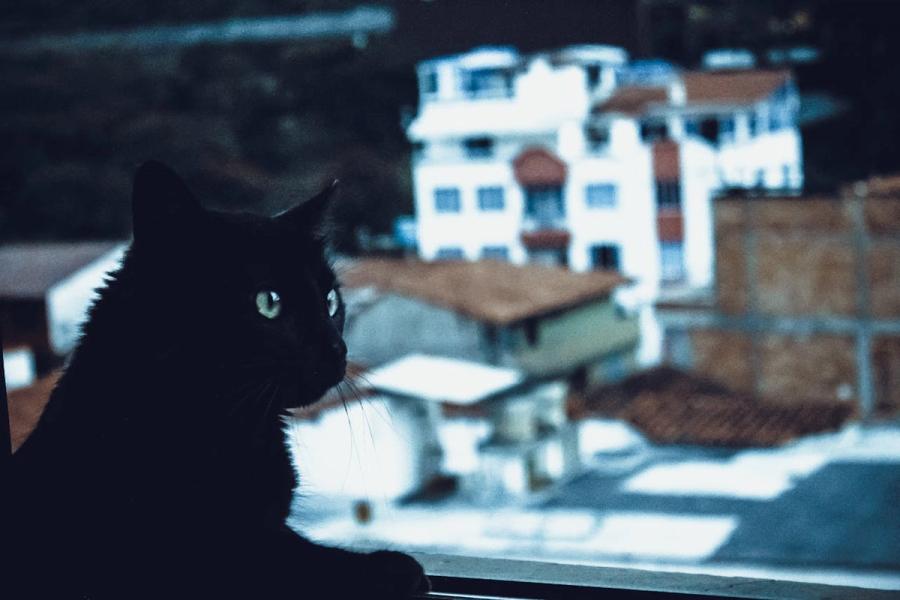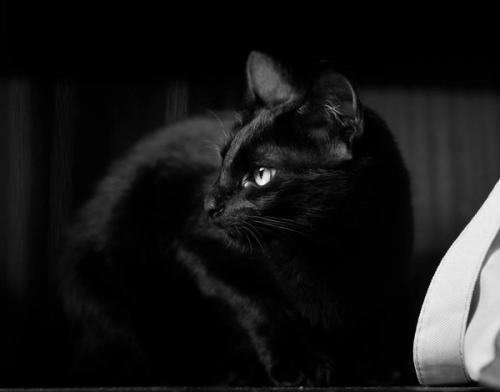
The Truth About Black Cats and Superstition
Published: 4/16/2025
Black cats have always carried an air of mystery. Their sleek coats, piercing eyes, and silent movements have made them iconic in folklore, pop culture, and Halloween decor alike. They show up in stories as witches’ sidekicks, omens of doom, or magical beings capable of shape-shifting and spell-casting. But behind the mystique is a long and complicated history—one that hasn’t always been kind to these beautiful animals.
Why have black cats been misunderstood for centuries? Why do some people still flinch when one crosses their path?
This post dives into the origins of black cat superstition, how different cultures have viewed them over time, and the very real impact those beliefs have today. Let’s separate the myth from the truth and give black cats the reputation they actually deserve.
Origins of Black Cat Superstition
The fear and suspicion surrounding black cats traces back to medieval Europe, a time when the unknown was often feared, and unexplained misfortunes—like disease, crop failure, or death—were blamed on supernatural forces. In a world where religion and fear of the devil shaped public thinking, black cats, with their ability to blend into the darkness and their independent nature, became perfect scapegoats.
By the Middle Ages, black cats were no longer just pets—they were accused of being “familiars” to witches or even witches in disguise. People believed they could assist in sorcery, spy for witches, or carry out evil deeds. This belief led to the widespread persecution of both women and their cats during witch trials across Europe.
The hysteria followed European settlers to the New World, where Puritanical beliefs amplified the fear. In places like Salem, Massachusetts, black cats were again linked to demonic forces, and owning one could be used as evidence in witchcraft accusations. The fear of these creatures was no longer just folklore—it was dangerous, deadly, and very real.
Global Perspectives: Not Always Unlucky
While much of Western Europe and early America feared black cats, other cultures saw them in a completely different light—sometimes even as symbols of good luck and protection.
In Ancient Egypt, cats of all colors were revered, but black cats were especially linked to Bastet, the goddess of home, fertility, and protection. To harm a cat—black or otherwise—was not only unthinkable, but punishable by death. Cats were seen as sacred guardians and honored even in burial rituals.
In Japan, black cats are considered to bring good fortune, especially to single women, who believe owning one increases their chances of attracting love. Similarly, in the United Kingdom, a black cat crossing your path is a sign of prosperity, not doom.
Sailors in maritime cultures often kept black cats aboard ships, believing they brought safety at sea and ensured a safe return home. Their presence was also thought to protect against storms and bad spirits.
In France, finding a single white hair on an otherwise black cat is a sign of impending good luck. In Latvia, black cats are associated with wealth and abundance—a far cry from the shadowy omens feared in other parts of the world.
These cultural differences show just how much geography influences superstition. What’s seen as sinister in one society can be sacred in another.

Common Black Cat Superstitions
Across the globe, black cats have been wrapped in a web of symbolism—sometimes revered, sometimes feared. In many parts of Western Europe and North America, the most persistent myth is that a black cat crossing your path brings bad luck. This idea has been echoed in countless stories, films, and Halloween traditions, painting black cats as omens of misfortune.
But in other parts of the world, the same black cat is seen as a sign of prosperity. In Japan, a black cat crossing your path is a good omen, and single women often believe black cats attract love. In the UK, spotting a black cat is associated with financial luck and positive change.
In Europe during the witch trials, black cats were believed to be witches’ familiars—creatures who served and protected witches, or worse, witches themselves in disguise. Seeing a black cat at a funeral, in some European superstitions, was believed to signal an impending death.
On a brighter note, French folklore says that if you find a single white hair on an otherwise black cat, it means good fortune. In maritime traditions, black cats were thought to protect sailors at sea, and many ships welcomed them as spiritual guardians and mousers alike.
These opposing beliefs reflect the way culture, tradition, and storytelling shape how we see the same creature—either as a threat or as a blessing.
The Real-World Impact of Superstition
Superstitions might feel like harmless old tales, but their effects can be heartbreakingly real—especially for black cats.
In shelters across the world, black cats are often overlooked and under-adopted. They tend to wait longer for homes, and in some areas, they have higher euthanasia rates than cats of other colors. This is known as Black Cat Syndrome—a combination of superstitious fear and aesthetic bias. Some people still associate black cats with bad luck, while others think they won’t photograph well for social media, making them less appealing in online adoption listings.
The problem becomes particularly urgent around Halloween, when shelters sometimes pause black cat adoptions altogether. The reason? Concerns that people may adopt black cats for the holiday as props or, worse, with harmful intent.
These outdated beliefs, whether conscious or not, can rob black cats of the loving homes they deserve. And that’s a real-world tragedy—especially when the only thing that sets them apart is the color of their fur.
Why Do These Superstitions Persist?
If we know these myths aren’t true, why do they still hang around?
Humans are hardwired to look for meaning in randomness. It’s comforting to believe there’s a reason behind a bad day or a missed opportunity—and blaming a black cat that happened to stroll by can feel easier than accepting chaos. This tendency to assign meaning to coincidences is at the root of many superstitions.
Over time, these beliefs become embedded in culture, passed down like stories around a campfire. They’re reinforced in childhood, in media, and in society’s collective imagination. Even people who say they don’t believe in superstitions might still hesitate when a black cat crosses their path.
It’s not always about fear—it’s about habit. And it takes awareness and intention to break that cycle.
The Truth: Black Cats Are Just Cats
Strip away the myths, and what’s left? Just a cat.
Black cats, like all cats, come in a range of personalities—some are playful, some are shy, some are lap-lovers, and others are curious explorers. Their dark fur is simply the result of genetics, not a supernatural marker of doom or magic. They don’t carry curses, cast spells, or bring misfortune any more than a ginger tabby or a white fluffball does.
In fact, many black cat owners will tell you their cats are among the most affectionate, loyal, and charming companions they’ve ever had. Once you look past the old legends, you see what they really are: beautiful, intelligent, and deeply deserving of love.
So if a black cat crosses your path, it’s not a warning—it might just be fate giving you the chance to meet your next best friend.
Conclusion
The myths surrounding black cats are as old as history itself—but they’ve never been fair. From being feared as witches’ sidekicks to being avoided in shelters, black cats have carried the weight of centuries of superstition.
But here’s the truth: black cats are just cats. They don’t bring bad luck. They don’t summon spirits. What they do bring is joy, companionship, and a little extra mystery—if you're lucky enough to welcome one into your life.
So the next time a black cat crosses your path, smile. It might just be the start of something wonderful.
Have a black cat story or want to bust a myth? Drop it in the comments—we’d love to hear from you! 🐾